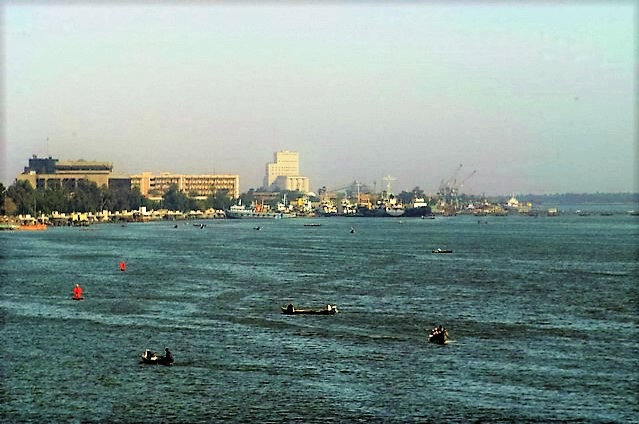
Battle of Basra (2003)
The Battle of Basra lasted from 21 March to 6 April 2003 and was one of the first battles of the 2003 invasion of Iraq. The British 7 Armoured Brigade fought their way into Iraq's second-largest city, Basra, on 6 April coming under constant attack by the Iraqi Army 51st Division and Fedayeen Saddam,[3] while elements of the Parachute Regiment cleared the 'old quarter' of the city that was inaccessible to vehicles. Entering Basra had only been achieved after two weeks of conflict, which included the biggest tank battle of the war by British forces when the Royal Scots Dragoon Guards destroyed 14 Iraqi tanks on the 27 March.
For other battles of Basra, see Battle of Basra.Background[edit]
Basra is a city of more than one million people, located in Southern Iraq. To military and economic planners, it represents a strategic objective because it sits near a port that provides access from inland Iraq to the Persian Gulf. The area around Basra itself produces much of Iraq's oil, which is processed at a local refinery. To the south-east is Rumaila oil field, which by itself contains billions of barrels worth of crude oil—14% of the world supply.[4] To the north-east is the West Qurna Field, the second-largest oil field in the world.
Britain captured Basra from the Ottoman Empire in 1914. In 1932, Iraq became nominally independent of Britain and British troops left a few years later. During the Second World War, the brief Anglo-Iraqi War broke out during 1941. British forces, unopposed, seized the city and surrounding area as a base for an advance towards Baghdad although the war came to an end before that occurred.
The city was a major target during the Iran–Iraq War of the 1980s and was bombed by the US in the 1991 Gulf War.
Basra was the site of a 1991 uprising to overthrow Saddam Hussein after the US had driven the Iraqi Army from Kuwait. Residents became embittered when support promised by the US did not materialize. Basra then suffered from years of sanctions and bombing, as well as bad treatment from Hussein. An Iraqi living in exile said in 2001: "Iraqis think Saddam is America's man. These people are not going to forget what has happened to them. In their eyes, it is genocide. And people do not forget genocide."[5][6]
The population of Basra saw a dramatic increase in birth defects and childhood cancer during the 1990s; these illnesses and others were blamed on US depleted uranium munitions used in 1991.[7] Sanctions compounded the problem by blocking access to medical equipment and increasing the price of supplies.[6][8]
The United States bombed Basra routinely throughout the 1990s and leading up to the Iraq War.[6]
Occupation[edit]
On 7 April, the Parachute regiment moved into the old town, meeting very little resistance.[70]
On 20 April, Basra residents gathered for a Shia religious festival whose celebration had not been allowed under Ba'athist rule. It was the first time they celebrated it in more than 20 years.[71]
By the 23 April 2003, oil was flowing through pipelines from the Basra area.[72] In the following months, the US reported acts of sabotage against the oil production and transport operations in the area.[73]
The Shias largely welcomed the occupation. However, even after the fall of Basra, British troops occasionally came under small arms fire, whilst Marine bases were attacked by RPGs or mortars at night.[74]
On the 4 July 2003, Wael Abdul Latif was appointed as Basra's provisional governor.[75][76]
In August, Basrans began mass demonstrations, which sometimes spilled over into riots. British soldiers in riot gear used rubber bullets against thousands of people filling the streets and throwing stones.[77]
In September 2003, a Basran named Baha Mousa died in British custody. Later investigation found that some British soldiers had used the illegal "five techniques" against multiple detainees from the area.[78]
In October 2003, the first Jaish al-Mahdi (JAM) units in Basra were established, which soon began low-level attacks against British troops and intimidated civilians working for the occupation forces.[79]